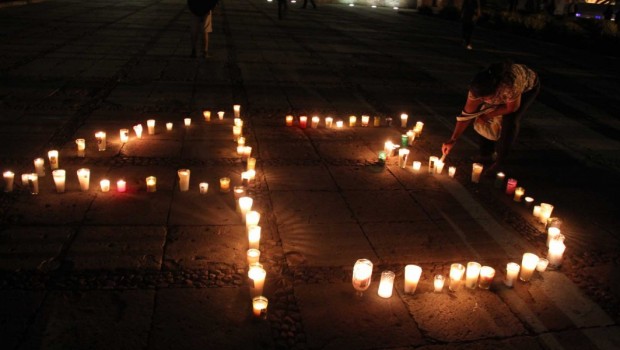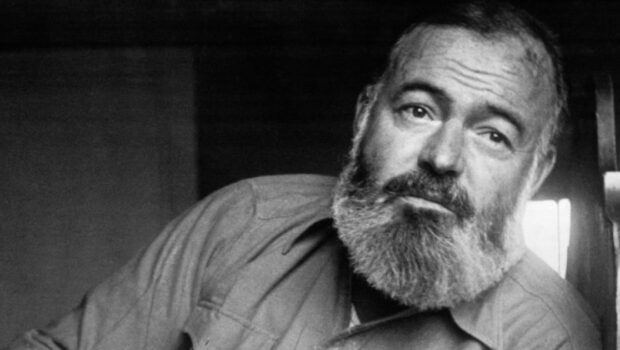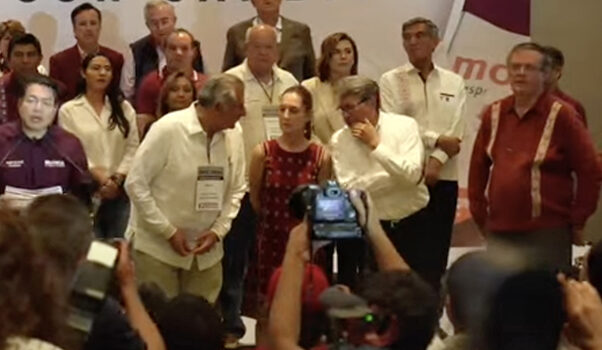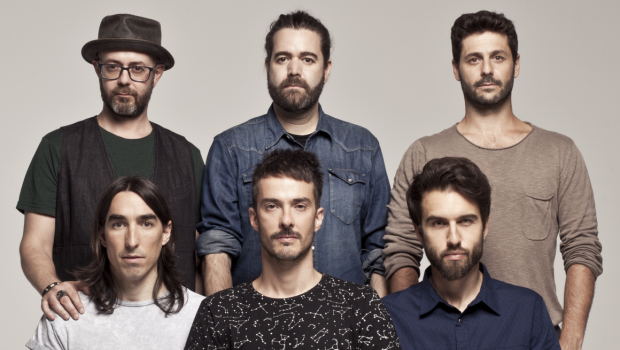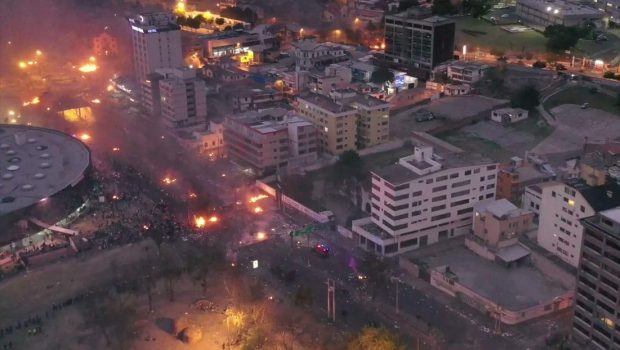A Devastating Report
Ayotzinapa. Demoledor informe del GIEI
Aleida Calleja
Translated by Tanya Huntington
“Don’t leave us here all alone,” was the tearful cry of the parents and relatives of 43 missing students enrolled in the rural teacher’s school of Ayotzinapa, directed at members of the Interdisciplinary Group of Independent Experts (IGIE) formed by the Inter-American Commission on Human Rights (IAHRC).
Their plea unnerved those of us in attendance during the delivery of the final report of the IGIE this past Sunday, April 24, not only because of the pain that the forced disappearance of their children represents for these families, but because in the end, what it conveys is a feeling of helplessness, of having been abandoned by justice and public safety in a travesty of human dignity.
As a result of the disappearance of the 43 students on the night of September 26, 2014 in Iguala, Guerrero—one of whom, Julio Mondragón, was found with his face skinned and eyes gouged out—and in response to public outcry, national and international indignation, and a lack of credible results from the investigations carried out by the Attorney General’s Office in what was termed “the historic truth,” the administration of Enrique Peña Nieto signed an Agreement of Technical Cooperation with the IAHRC authorizing the creation of the IGIE.
This agreement forms part of the Precautionary Measures that the IAHRC extended to the relatives in response to the extra-judicial execution and forced mass disappearance of the students of Ayotzinapa. These were granted on October 3, 2014 in order to contribute to the process by providing technical assistance in the search for the 43 missing students and sanctioning anyone found responsible and moreover, carrying out a technical analysis of the comprehensive plan to attend to the survivors and relatives of the students.
The report is devastating not only because it points out multiple fallacies in the investigation, such as the use of torture as a means to obtain confessions for use as evidence in lieu of investigations based on forensic proof, the concealment of evidence and the dilation of access to information by the selfsame authorities, thus fragmenting the inquiry. The report is also devastating because it questions the viability of the justice system in Mexico.
The revelations of the report attest to the participation of additional State authorities who confined the students for hours. Who knew what was happening and yet denied them any support, leaving them at the mercy of their executioners.
The discovery of a video recorded by local journalists places the Director of the Agency of Investigation of the Attorney General’s Office, Tomás Cerón, at the river of San Juan on October 28, nearly a month after the events, performing a procedure that does not appear in the investigative report. Bags with human remains are visible that are very similar to those that divers later found on October 29, raising the suspicion that the evidence was planted there.
These facts, registered in the report, point to a cover-up by federal authorities given that both the army and the federal police knew what was going on that night in Iguala and yet, did nothing. Local police from Iguala (and apparently, Hitzuco as well) participated in the persecution of the young men and arrested them in order to allegedly hand them over to organized criminals, indicating alleged collusion with organized crime.
The administration of Enrique Peña Nieto has chosen not to renew the Technical Assistance Agreement with the IACHR, despite the fact that he personally requested assistance from this organization for the protection of human rights in the search for the 43 missing students, denying thus international partners ready to support our incompetent justice system, which has a record of impunity in 98 percent of all cases in Mexico, according to the 2016 global impunity index.
Although a chorus of journalists and “human rights defenders” sympathetic to the administration disqualify what will be the IGIE’s final report, the fact is that this group of experts has contributed considerably to the case, encountering new lines of investigation that pointed to a possible motive for the attack: the intent to prevent the buses from departing due to the fact that they were being used to traffic heroin into the United States; as well as new potential levels of state responsibility and involvement of authorities, thus revealing that the “historic truth” of the federal government is based on proof of dubious scientific origin. The report likewise highlights the importance of listening to the families and the testimonies of the surviving students, as well as those who live in Guerrero, who describe their state of fear and the collusion between organized crime and the authorities.
The government chose to confront the IACHR instead of recognizing its own responsibility. The presence of the IGIE caused the state discomfort to such a degree, that no officials presented themselves to receive the final report. The IGIE and the President of the IACHR, James Cavallaro, were therefore unable to deliver this detailed description of serious human rights violations. Which sends a dire message from the federal government, not only to this international organization, but also to the victims and to those who accompany them, those who have been demanding truth and justice over the past nineteen months.
Ayotzinapa is an open wound in Mexico, one that has been exacerbated by reports of 26,000 forced disappearances across the country, in many cases with the direct participation of government agents.
“We hope that civil society will continue to accompany the families. We leave them in a state of concern,” said the IGIE, and we are also left with concerns, because the government, by deciding they must leave the country, has also limited the level of international scrutiny required to ensure the safety of the families and their access to justice.
A scrutiny that has been confined by the government so that Mexican society may never learn the truth. Within the context of serious human rights violations, there is a special obligation that demands that States inform not only the victims and their families, but also society as a whole regarding what has taken place, in order to restore trust in state institutions and to avoid repetition of such acts.
Our thanks to the IEGI for its solidarity with the victims’ families. We demand that the federal government clarify said facts and its own dubious actions, to say the least.
 Aleida Calleja is a public speaker and expert on freedom of speech, democracy, and human rights with a lengthy career focused on areas related to freedom of speech and the right to information in Mexico and Latin America. She chairs the Asociación Civil Comunicación Comunitaria and coordinates advocacy for the Observatorio Latinoamericano de Resolución Medios y Convergencia (OBSERVACOM). Twitter: @callejag
Aleida Calleja is a public speaker and expert on freedom of speech, democracy, and human rights with a lengthy career focused on areas related to freedom of speech and the right to information in Mexico and Latin America. She chairs the Asociación Civil Comunicación Comunitaria and coordinates advocacy for the Observatorio Latinoamericano de Resolución Medios y Convergencia (OBSERVACOM). Twitter: @callejag“No nos dejen solos”, fue el grito con llanto de los familiares y los padres de los 43 estudiantes de la normal rural de Ayotzinapa desaparecidos a los integrantes del Grupo Interdisciplinario de Expertos Independientes (GIEI) de la Comisión Interamericana de Derechos Humanos (CIDH).
La súplica estremeció a los asistentes al último informe del GIEI este pasado domingo 24 de abril, no sólo por el dolor que representa para los padres la desaparición forzada de sus hijos, sino porque en el fondo lo que refleja es un sentimiento de desamparo, de orfandad de justicia y seguridad, que lastima la dignidad humana.
A raíz de la desaparición de los 43 estudiantes el 26 de septiembre de 2014 por la noche en Iguala, Guerrero, de los cuales uno, julio Mondragón, fue encontrado con el rostro desollado y ante el reclamo, la indignación social nacional e internacional y la falta de credibilidad ante los resultados de las investigaciones por parte de la Procuraduría General de Justicia con lo que llamó “la verdad histórica”, el gobierno de Enrique Peña Nieto hizo un Acuerdo de Cooperación Técnica con la CIDH para la creación del GIEI.
Este acuerdo forma parte de las Medidas Cautelares que la CIDH dio a los familiares por la ejecución extrajudicial y desaparición forzada masiva de los estudiantes de Ayotzinapa, las cuales se otorgaron el 3 de octubre de 2014, para coadyuvar en el proceso al proporcionar asistencia técnica para la búsqueda de los 43 estudiantes desaparecidos a fin de sancionar a quienes resulten responsables, y de igual forma, realizar un análisis técnico del plan integral de atención a sobrevivientes y familiares de los estudiantes.
El informe es demoledor al señalar no solamente las múltiples falencias de la investigación, como la utilización de la tortura como medio para obtener confesiones como prueba en lugar de investigaciones basadas en pruebas periciales; ocultamiento de pruebas y dilación en el acceso a información por parte de las misma autoridades que fragmenta las averiguaciones; y omisión ante varias líneas de investigación que debieran de ser seguidas por las autoridades para dar con los responsables no sólo materiales sino también intelectuales, sino porque además acusa el funcionamiento del sistema de justicia en México.
Las revelaciones del informe dan cuenta de la participación de más autoridades de Estado que cercaron a los estudiantes durante horas, que supieron lo que estaba sucediendo y les negaron cualquier apoyo dejándolos a merced de sus victimarios.
El descubrimiento de un video tomado por periodistas locales donde se muestra al Director de la Agencia de Investigación de la PGR, Tomás Cerón el 28 de octubre, casi un mes después de los hechos, en el río de San Juan, en una diligencia que no consta en el expediente de investigación, en el que se ve bolsas con restos humanos muy similares a los que después encontraron los buzos pero el 29 de octubre, hace sospechar la siembra de evidencias.
Estos hechos plasmados en el informe nos señalan un encubrimiento de las autoridades federales porque el ejército y las policía federal sabían que estaba sucediendo esa noche en Iguala pero no hicieron nada. Las policías locales de Iguala y al parecer de Huitzuco participaron de la persecución a los jóvenes y los detuvieron para supuestamente entregarlos al crimen organizado lo que señala la posible colusión con el crimen organizado.
Aunque el coro de periodistas y “defensores de derechos humanos” afines al oficialismo descalifiquen lo que fue el último informe del GIEI, lo cierto es que ese grupo de expertos aportaron mucho al caso porque encontró nuevas líneas de investigación que plantean como posibilidad que el objetivo de la agresión fuera no permitir la salida de los camiones, debido a que pudieran ser utilizados para tráfico de heroína a Estados Unidos; nuevos posibles niveles de responsabilidad estatal e involucramiento de autoridades; develar que la “verdad histórica” del gobierno federal se basa en pruebas de dudoso origen científico; la importancia de escuchar a las familias y los testimonios de los normalistas sobrevivientes y a personas que viven en Guerrero y que hablan del miedo y de la colusión entre el crimen organizado y las autoridades.
El gobierno prefirió la confrontación con la CIDH, en lugar de reconocer sus responsabilidades en los hechos como Estado, la presencia del GIEI le incomodó hasta tal punto que ninguna autoridad asistió al informe. El GIEI y el Presidente de la CIDH, James Cavallaro, no tuvieron a quien entregarle el informe que muestra de cuerpo entero graves violaciones a los derechos humanos. Es un mensaje aciago por parte del gobierno federal, no sólo a ese organismo internacional, sino también a las víctimas y a quienes les acompañan que reclaman desde hace un año y siete meses, verdad y justicia.
Ayotzinapa es una herida abierta para México, como lo son las denuncias de 26 mil desapariciones forzadas a lo largo y ancho del país, en las que en muchas de ellas hay participación directa de agentes estatales.
“Esperamos que la sociedad civil acompañe a las familias. Nos vamos preocupados por ellos”, dijo en su último mensaje el GIEI, nosotros nos quedamos preocupados porque el gobierno, al sacarlos del país, también confina el escrutinio internacional para la seguridad de las familias y su acceso a la justicia.
También confina ese escrutinio para que la sociedad mexicana conozca la verdad. En el contexto de violaciones graves de los derechos humanos, existe una obligación particular que exige que los Estados informen acerca de lo ocurrido no solo a las víctimas y sus familias, sino también al conjunto de la sociedad a fin de restablecer la confianza en las instituciones estatales y evitar la repetición de esos actos.
Gracias al GIEI y solidaridad con las familias. Exigencia al gobierno federal para esclarecer los hechos y su dudosa actuación, por decir lo menos.
 Aleida Calleja es comunicadora y experta en temas de libertad de expresión, democracia y derechos humanos, con amplia trayectoria en temas vinculados a la defensa de la libertad de expresión y derecho a la información en México y América Latina. Es Presidenta de la Asociación Civil Comunicación Comunitaria y Coordinadora de Advocacy del Observatorio Latinoamericano de Regulación Medios y Convergencia (OBSERVACOM). Twitter: @callejag
Aleida Calleja es comunicadora y experta en temas de libertad de expresión, democracia y derechos humanos, con amplia trayectoria en temas vinculados a la defensa de la libertad de expresión y derecho a la información en México y América Latina. Es Presidenta de la Asociación Civil Comunicación Comunitaria y Coordinadora de Advocacy del Observatorio Latinoamericano de Regulación Medios y Convergencia (OBSERVACOM). Twitter: @callejag


